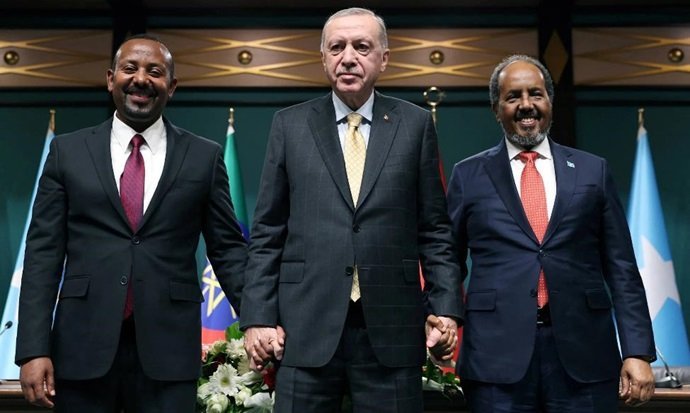By Institute for the study of war (ISW)
Ethiopia has little room to balance between the SFG and Somaliland and their competing deals after it agreed to the Ankara Declaration due to the zero-sum positions of the SFG and Somaliland on Somaliland’s sovereignty. Somali officials insisted that Ethiopia withdraw from its deal with Somaliland in previous Turkish-mediated discussions and called the Somaliland agreement a violation of Somali “territorial integrity. The Ankara Declaration implicitly acknowledges the SFG’s position without directly mentioning Somaliland when the text says that Ethiopia and Somalia “reaffirmed their respect and commitment to one another’s sovereignty, unity, independence, and territorial integrity. Somaliland officials have insisted that Ethiopia’s recognition of Somaliland is required if Somaliland is to follow through on its agreement to lease Ethiopia land for a naval base.
The Ankara Declaration gives Ethiopia an alternative to the Somaliland deal because the agreement theoretically provides Ethiopia access to the Red Sea and Indian Ocean. Ethiopia has sought to acquire sea access since it became landlocked, after Eritrea gained independence from Ethiopia in 1993.The Ankara Declaration recognized the “potential benefits” of Ethiopian commercial access to the Red Sea and stipulated that Ethiopia and Somalia will hold technical talks in February to ensure this access no later than June 2025.
Officials from Somalia and Somaliland have made contradictory statements about whether Ethiopia will follow through on the Somaliland deal. Somali officials said on December 12 that Ethiopia retracted its agreement with Somaliland as part of the Ankara talks. Somaliland officials said that the Ankara Declaration “does not concern” Somaliland and that Ethiopia has insisted privately that it will not withdraw from the Somaliland deal.
Future international recognition of Somaliland’s statehood would give Ethiopia greater political cover and legitimacy to resume talks on a port deal with Somaliland. No countries currently recognize Somaliland, although many countries have consulates and diplomatic relations with Somaliland. US policymakers are increasingly contemplating giving US recognition to Somaliland’s independence, however. US State Department officials who worked on Africa policy during US President-elect Donald Trump’s first term have voiced public support for the US to recognize Somaliland. US Republican House Representative Scott Perry introduced a bill on December 12 for US recognition of Somaliland independence.The US news outlet Semafor reported in December that Trump advisers and US congressional Republicans plan to encourage Trump to recognize Somaliland’s independence when he takes office, in January 2025. US recognition of Somaliland could encourage other countries, including Ethiopia, to extend recognition to Somaliland.
Ethiopia’s withdrawal from the Somaliland agreement would likely lead the SFG to reverse its decision to exclude Ethiopian troops from the new AU mission in Somalia in 2025.
Somali officials in June ordered Ethiopian forces to withdraw from Somalia at the end of the current AU mission at the end of 2024 if Ethiopia followed through on its deal with Somaliland. Somalia shifted its tone in the Ankara Declaration, however, and acknowledged “the sacrifices of Ethiopian soldiers within the African Union Missions.”[20] The Somali national security adviser said on December 15 that the SFG is reviewing the decision to exclude Ethiopian forces from the new AU mission.
Ethiopia’s continued military presence in Somalia as part of the new AU mission would allow Ethiopia to continue fighting al Shabaab. Ethiopia seeks to maintain troops in Somalia to counter al Shabaab and create a buffer zone to prevent cross-border incursions. Al Shabaab demonstrated its strength near the Ethiopian border and threat to Ethiopia when it conducted a multiday campaign inside Ethiopia for the first time in July 2022. Several hundred militants from the 2022 offensive established a rear base along Ethiopia’s southeastern border with Kenya. Al Shabaab also regularly attacks Ethiopian forces in Somalia and uses anti-Ethiopian propaganda as a recruiting tool. Local politicians in Somalia and Somalia’s international partners had signaled their support for Ethiopia’s continued participation in the new AU mission, and CTP previously assessed that Ethiopia would likely remain in Somalia despite the SFG’s demands.
Source: ISW


Leave a Reply